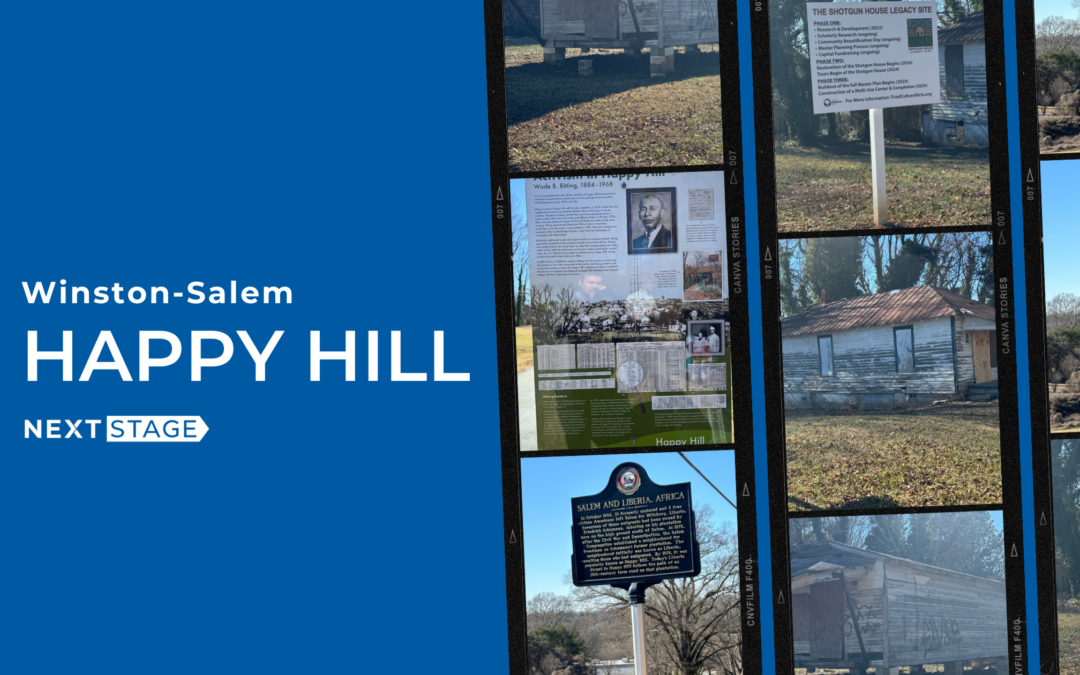Happy Hill Neighborhood
Last month, Next Stage CEO, Josh Jacobson, and I had the opportunity to formally tour the Happy Hill neighborhood in Winston-Salem, NC. The historically African American community has been disenfranchised and underfunded for decades – but community leaders have persevered over the years, fighting for neighborhood improvements and historical recognition. When we visited, leaders from the Happy Hill Neighborhood Association graciously shared this history while we walked together through the neighborhood.
The experience was transformative and profound. For me, it also evoked feelings of frustration, hope, anger, sadness and grief. I can empathize and resonate with the collective and persistent trauma faced by Black individuals, families and communities all over this country, since the beginning of its time.
The Vision
As we toured the historical neighborhood, I felt pride for our Black ancestors who were truly visionary for their time, such as the seven freed men who were the original building blocks of the Happy Hill community. Rather than distancing themselves from their oppressors, they had a vision to purchase land to secure generational freedom, wealth and opportunity. Unfortunately, their vision was met over the years with egregious injustices by local government and developers to claim the land and develop buildings and homes based on their plans for the city – without input from the residents who have lived and tended the community for generations.
These founding families deserve so much more recognition for the genuine love, commitment and dedication they had to give their people the opportunity to crawl out from under centuries of oppression. When visionaries like the beautiful souls serving the Happy Hill Neighborhood Association make and take space to be courageous enough to stand up and speak out against the injustices done to their neighborhood, it reminds me that amidst the anguish, collective determination rises as an even more powerful force. In witnessing their courage, I’m reminded that from this shared pain can emerge a strength that fuels transformative change and a united voice against systemic injustices.
Anger, Frustration, Heartbreak and Hope
I felt conflicted as a Black woman, whose recent ancestors came to America of their own will, to try to make a better life for their families and achieve an “American dream” – promised to all and still only intended for some. For the some that can pick themselves up by the “bootstraps” to amass all of the resources needed to push out those they don’t think are deserving of a dream. The pursuit of an elusive American dream echoes the struggles of my own ancestors. As I delve into the layers of my family’s history, I strive to uncover and understand my roots while navigating the complexities of identity and belonging.
Through Happy Hill’s stories of survival and determination, I find strength. It is fueling my commitment to contribute to a more just and inclusive society, forging a connection between my experience and the enduring legacy of determination from those who’ve faced unimaginable hardships.
I felt such anger, frustration, and heartbreak for the families who have been fighting for what is rightfully theirs for generations. This experience transformed me. Not only by the discomfort I felt, but also by the hope for the future I left with. I witnessed the determination, fire and unconditional love from the women who showed us around their neighborhood.
Persevering for Preservation
Our tour guide called me in, to bring attention to the notion that the Happy Hill community should not be seen or known as resilient because they should not have to be. For many, many years, the Happy Hill community was told their stories and their histories weren’t important and weren’t worth being preserved. And yet, they persevered to receive historical designations for their land and they continue to pour into the heart of their community through fervent advocacy, community gatherings, and oral storytelling – that is determination.
In closing, our visit to Happy Hill brought me tremendous hope because I feel inspired to tell the story of what I witnessed there, and I’ve met the gifted activists who are determined enough to continue showing up for their home.
